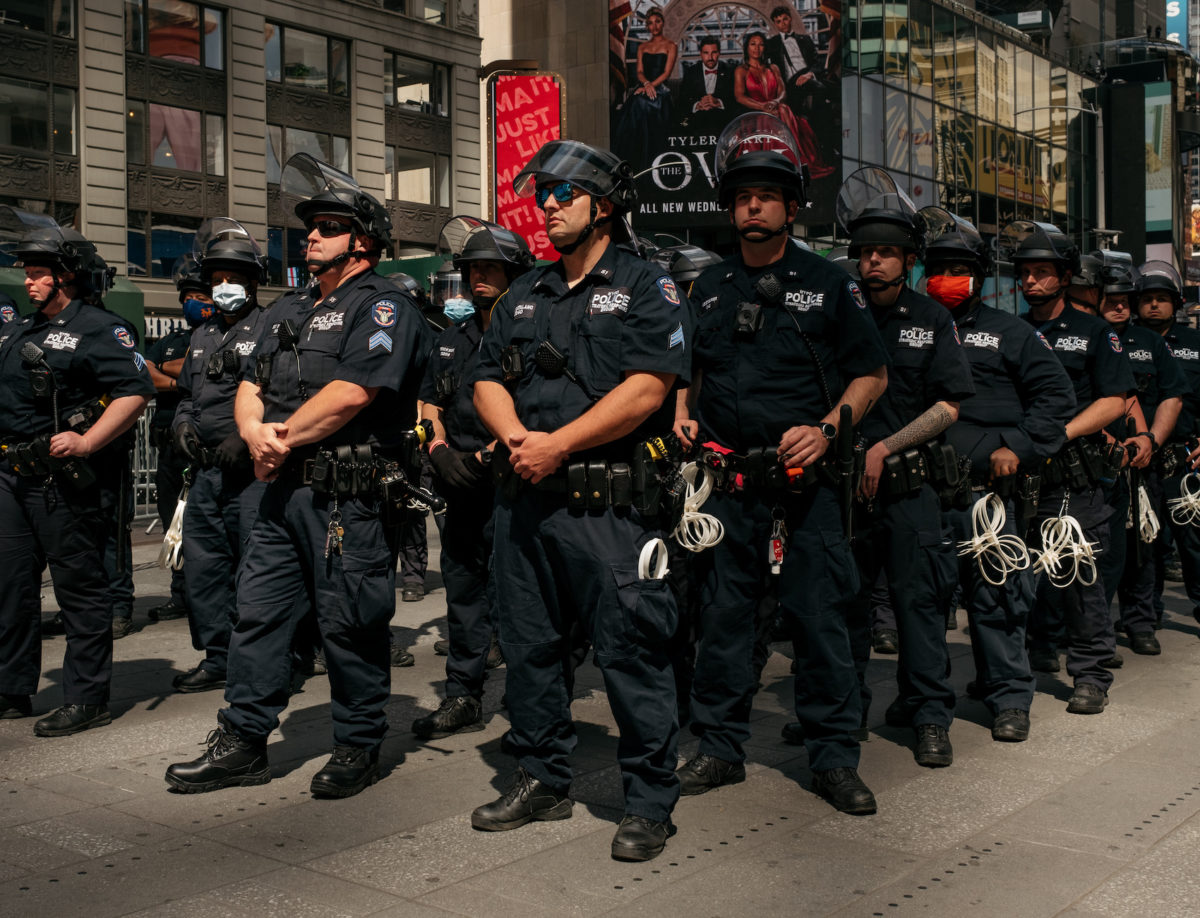Defund the Police Now
More training, more equipment, and more officers will not stop police from killing Black people.

This piece is a commentary, part of The Appeal’s collection of opinion and analysis.
Protests are erupting across the U.S. in response to the killing of George Floyd. In a widely watched video, Floyd, a Black man, repeatedly exclaims, “I can’t breathe,” as Derek Chauvin, a white Minneapolis police officer, kneels on his neck for 8 minutes and 46 seconds, according to a criminal complaint. Chauvin has since been charged with third-degree murder and second-degree manslaughter.
Just days after Floyd’s brutal death, Mississippi Attorney General Lynn Fitch announced she would drop the manslaughter charges against Columbus police officer Canyon Boykin, who killed Ricky Ball, a 26-year-old Black man, in 2015. Boykin, a white man, shot Ball after he ran from a traffic stop. All the evidence, Fitch said, “points to necessary self-defense.” Boykin reached a settlement in 2017 with the city for wrongful termination after he was fired.
Convictions of officers involved in police shootings are rare. According to Philip Stinson, a Bowling Green State University professor of criminal justice, between 2005 and 2017, 82 officers were charged with murder and manslaughter for on-duty shootings. Only 35 percent of those officers were convicted. Comparatively, in cases involving people charged with a felony, the general public is convicted 66 percent of the time and incarcerated 50 percent of the time, according to the Bureau of Justice Statistics.
The officers involved in the deaths of Philando Castile, Freddie Gray, and Terence Crutcher were acquitted or had the charges brought against them dropped. The officers involved in the deaths of Alton Sterling, Tamir Rice, and Michael Brown were never charged.
But how do we stop police killings of Black people before they happen? Three words: Defund the police.
In 2016, the Columbus City Council spent $10.4 million, or about 48 percent of its general expenditures, on public safety, which includes the police and fire departments. This funding was used for law enforcement salaries, training, and equipment. But none of this spending led to a safer Columbus.
At the end of 2016, murder, robbery, and sex crimes were at their highest since 2012, according to Columbus Police Department statistics. More police officers with more training and more equipment did not decrease crime.
That is because crime is a response to social conditions. More policing cannot fix social conditions; only investments in communities can.
Yet, in the same year, the city council spent roughly $1.4 million, or just 6 percent of its general expenditures, on “culture and recreation” and “conservation, urban and economic development.” This is an underinvestment in community-based programs that support low-income communities.
In a 2018 study, researchers at New York University found that “in a city of 100,000 people, each new non-profit community organization [led] to a 1.2 percent drop in the homicide rate, a 1 percent decrease in violent crime rate, and a 0.7 percent reduction in property crime rate.” Expanding social and economic programs for under-resourced communities leads to an overall decrease in crime.
Columbus needs more resources for mental health services, educational programming, food and assistance programs, and workforce development. Its city council should follow the lead of other cities, like Austin, where the Austin Justice Coalition, a nonprofit grassroots organization, pressured the city council to cut the city’s police union contract in half. In Durham, North Carolina, the work of activists resulted in the city council rejecting the police department’s request to hire 18 additional officers. And in New York, the Policing & Social Justice Project, a project of the City University of New York, has proposed a $1 billion cut to the NYPD budget over the next four years.
Divestments like these are necessary for the safety of citizens like Ball and Floyd. Fewer police officers means fewer police interactions that result in the shooting and killing of Black people.
We do not need more police. We do not need more surveillance and more police on patrol. We do not need better police technology and more community-police partnerships. We do not need more reactive responses to Black death, like charges that rarely lead to convictions.
Instead, we need to provide our communities with opportunities to flourish. We need more funding for economic programming and community development. We need more funding for educational programs. We need more funding for social services that help victims of poverty and violence. We must prioritize the people over the police.
Perhaps, in a world with fewer police, Floyd and Ball would still be here.
Justin Brooks is a native of Starkville, Mississippi, and a third-year law student at the University of California, Berkeley, School of Law.
